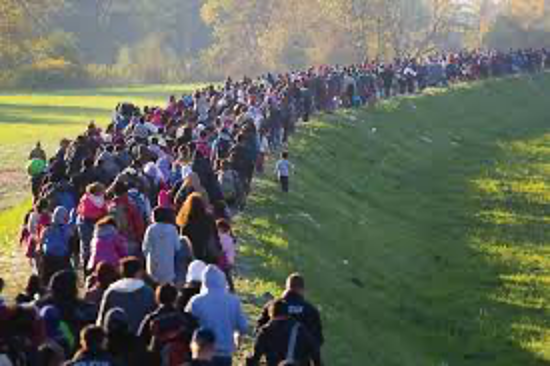
This module will provide students with a thorough understanding of the relevant contexts of Refugee Care (as a theoretical and applied field). Refugee Care has not been a subject at post-graduate academic level and this module aims to contribute modestly to this development by creating a coherent framework within which Refugee Care can be located meaningfully. This module complements the 'Therapeutic Care for Refugees' module in so far as it will assist students develop a thorough understanding of the (inter-)relationship between Therapeutic Care with other academic disciplines.
Learning Outcomes
On satisfactory completion of this module students are expected to be able to:
Demonstrate an understanding of the multidisciplinary nature of Refugee Care.
Demonstrate an ability to approach Refugee Care from wider academic perspectives which include specific insights that enrich the comprehension of key terms and processes in this field (e.g. hospitality, otherness, gender, culture, care).
Demonstrate an understanding of relevant parameters of Refugee Care (e.g. economic, historical, legal)

Learning Outcomes:
By the end of the module you should be able to:
Become familiar with the overall issues, debates and literature on the Psychosocial perspective of Human Rights
Develop a systematic understanding of the 'victim, perpetrator, saviour' triangle
Acquire a working knowledge of the epistemological issues concerning the interaction between intrapsychic, interpersonal and socio-political realms
Syllabus
1. Human rights and psychological considerations: defining the field of the psychosocial phenomena; epistemologies of combining the intrapsychic, interpersonal and socio-political realms; the spectrum of relevant methodologies.
Lecturers: Andrew Fagan and Renos Papadopoulos
2. Identity, identification and group identities: gender, ethnicity politics, religion, culture; essentialist and constructivist perspectives; the psychosocial dynamics of purity and genocide.
Lecturer: John Packer
3. Difference, conflict and violence: otherness, marginalisation and the psychosocial dynamics of conflict escalation; intrapsychic, interpersonal and socio-political dimensions.
Lecturer: Renos Papadopoulos
4. The psychological dynamics of the Victim triangle (Perpetrator - Victim - Rescuer): focus on the Perpetrator: essentialist and constructivist perspectives; the making of a human rights violator; intrapsychic, interpersonal and socio-political dimensions
Lecturer: Renos Papadopoulos (or Ana Ljubinkovic)
5. Focus on the Victim: essentialist and constructivist perspectives; the making of a Victim (debates in Victimology); intrapsychic, interpersonal and socio-political dimensions
Lecturer: Renos Papadopoulos (or Ana Ljubinkovic)
6. Focus on the Rescuer: essentialist and constructivist perspectives; the making of a Rescuer; intrapsychic, interpersonal and socio-political dimensions
Lecturer: Renos Papadopoulos (or Ana Ljubinkovic)
7. Compliance to authority: classic and current perspectives to this debate. Implications for Human Rights.
Lecturers: Andrew Fagan
8. Psychological trauma; individual and group trauma; trauma theories and implications; classic and current debates; Post Traumatic Stress Disorder, Resilience and Adversity-Activated Development.
Lecturers: Renos Papadopoulos (or Ana Ljubinkovic)
9. Approaches to conflict resolution: the range of approaches with particular emphasis to the constituent psychosocial dimensions
Lecturers: John Packer and Renos Papadopoulos
10. An overview (revisiting and focusing on anything else of relevance).
Lecturers: Andrew Fagan and Renos Papadopoulos

This module will examine in depth some of Jung's key texts. The first half of the module will critically explore texts relating to Jung's theory of myth and its application. It will also include analysis of the mythopoeic dimension of Jung's own writing. The second half of the module will examine texts exemplifying Jung's work as psychological theorist and as critic of science, religion, and society. Again, attention will be given to the manner as well as the matter of Jung's writing. The particular texts studied on the module may change from year to year.
Aims:
To develop the ability to analyse closely various key texts by Jung
To acquire a thorough knowledge and critical understanding of Jung's writings on the specific topic of myth, and an ability to explain the position of these writings within Jung's work as a whole
To develop, through study of primary sources, a critical understanding of the various means (empirical, philosophical, rhetorical, etc.) by which Jung articulates and substantiates his psychological theory and deploys it in his critique of science, religion, and society
Learning outcomes:
By the end of the module, students should be able to:
Critically evaluate the guiding ideas, underlying assumptions, forms of argument, uses of evidence, and modes of expression in key texts by Jung
Demonstrate thorough knowledge of and an ability critically to examine Jung's texts on myth, his theory of myth, and the mythopoeic dimension of his own thought and writing
Demonstrate detailed knowledge of and an ability critically to examine texts exemplifying diverse facets of Jung's work as psychological theorist and critic of science, religion, and society
- Module Supervisor: Roderick Main

This module explores the historical, philosophical, cultural, and religious background of analytical psychology. It includes a core of seminars in which special attention is paid to Jung's collaborative relationship with Freud and to their divergence. In the other seminars, issues more specific to Jung's own thinking and to their development in analytical psychology are explored. This structure allows the development of a comparative as well as a contextual view of analytical psychology.
Aims:
To provide historical, philosophical, and cultural background that will enrich understanding of the origin and nature of analytical psychology;
To foster a critical approach to the history and theory of analytical psychology and, more particularly, to the nature and validity of evidence and interpretation; and
To explore the value of contextual understanding for the comparative study of analytical psychology and psychoanalysis.
Objectives:
By the end of the module, you should be able to:
Show how analytical psychology emerged out of, differentiated itself from, and continues to develop in relationship to specific but complex socio-cultural conditions (both immediate and long-term), and use this ability to illuminate similarities and differences between the two main schools of depth psychology, psychoanalysis and analytical psychology;
Discuss analytical psychology with awareness that it is diverse and complex, has a past and disputed histories of that past, and changes continually;
Demonstrate how analytical psychology 'bites its own tail', i.e., provides critical theoretical perspectives both on the events and circumstances of its own past and on the disciplines (e.g., biography, history, philosophy) by which we might try to establish and evaluate its past;
Deploy various critical and academic skills (e.g., how to evaluate historical sources, philosophical arguments, or cultural artefacts) in the investigation of the theories and texts of analytical psychology; and
Understand the process and limits of interpretation as a form of enquiry.
- Module Supervisor: Christian McMillan

The module introduces the central theoretical concepts of analytical psychology, which will be located within critical, comparative and experiential perspectives. A further aim is to introduce students to the general field of contemporary post-Jungian psychology and familiarise them with the relevant literature. The interface between analytical psychology and psychoanalysis will be foregrounded. In addition, opportunities will be provided for the theoretical exploration of the connection between these key concepts and their clinical use.
- Module Supervisor: Ann Addison

The themes may change from year to year, but the outline below gives an idea of the kinds of topics:
A. Analytical Psychology and Society
1. Politics and depth psychology: history and critique of the relationship between the two. Possibilities, problems, contemporary examples. Political and social roles of analysts and psychotherapists.
2. Economic theory, economic policy and models of human nature. Depth psychologist's assessment of 'alternative economics' (e.g. local exchange and trading schemes, social and emotional audit, Third World debt reduction, taxation of consumption, greening of production, sustainability).
3. Environment and depth psychology: contributions from Jungian and post-Jungian psychology to ecological discourse. Prospects for 'ecopsychology'. Critical discussion of 'ecofeminism' and 'ecomasculinism'.
4. Home, homecoming and the refugee experience. Dilemmas engendered in the refugee condition. The dependency syndrome and its political ramifications.
B. Analytical Psychology, Knowledge and Violence
1. Gnosticism old and new. The epistemology of gnosticism in modern society; political, religious and therapeutic dimensions.
2. From human destructiveness to atrocities. Violence and the psychologisation of evil.
C. Analytical Psychology, Gender and Sexuality
1. Masculinity: and femininity: constructing a multi-disciplinary approach. Prospects for change in male and female psychological role and performance. Relations between men and women, and parents and children. Aggression and violence.
2. Sexual orientation: history of depth psychological approaches to homosexuality. Homophobia and heterosexism. Discussion of viability of clinical approaches to homosexuality.
D. Analytical Psychology and Professionalisation
1. Organisational dimensions of analytical training and practice: ethical and therapeutic implications. The subversive and marginalised positions of psychotherapy in the context of the societal discourse of the expert. The mercenary model of psychotherapy.
2. The dialectics of pathologizing, and the care industry. De-pathologizing the political, and de-psychologizing human suffering.
This module is designed to appraise the applicability of Jungian and post-Jungian modes of enquiry in diverse social and cultural fields with special reference to selected pressing problems in contemporary Western societies. Current controversies and debates will be presented for evaluation from the perspective of Jungian and post-Jungian psychology. The relevance of the epistemological, ethical and clinical positions developed within the Jungian and post-Jungian traditions for those working in other fields will be elucidated. The wide diversity of topics covered in this course is deliberate; it is intended to explore the broad applicability of these theories whilst at the same time to illustrate the methodology of how general principles are applied to social and cultural issues.
- Module Supervisor: Orsolya Lukacs
